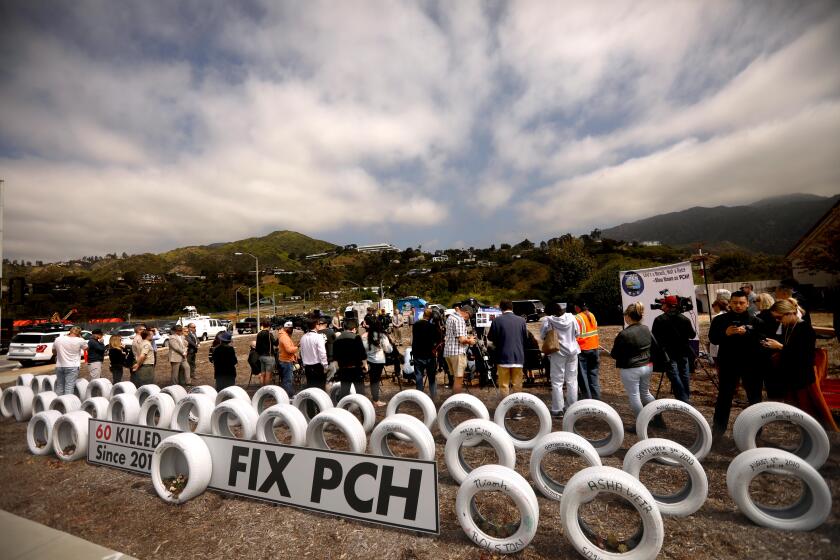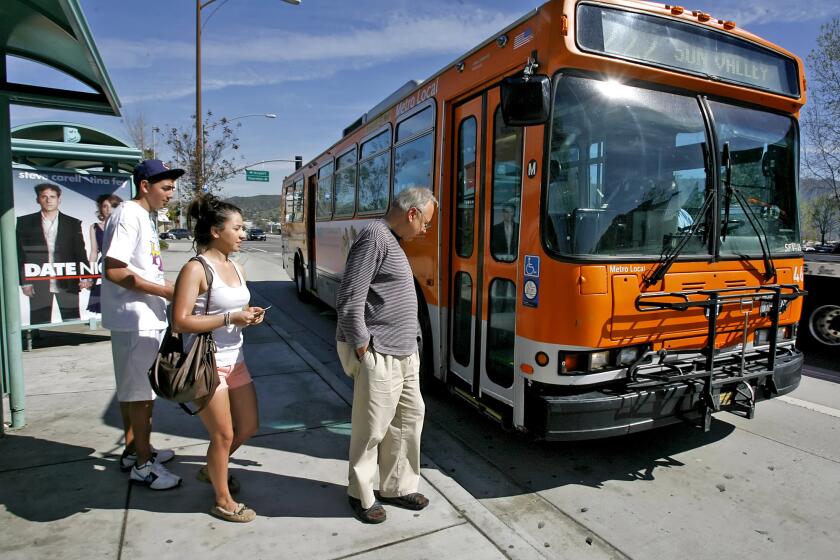Frequent Flier Finds Routine Much the Same, Sans the Crowd
It is, oddly enough, the low, steady rumble of jet engines that comforts Laura O’Brien and hints that, yes, the skies are still safe.
More than a week after terrorists turned passenger jets into deadly missiles and grounded the nation’s airlines, O’Brien and countless others who depend on air travel for their livelihood are beginning to creep back to deserted concourses and half-empty planes.
For O’Brien, an extraordinary commuter who flies four days each week between her home in Toluca Lake and her work in San Jose, Wednesday marked the first flight since hijackers destroyed the World Trade Center and damaged the Pentagon.
So the 16-hour day, 800-mile round trip that the 43-year-old commercial real estate broker has perfected over the last six years grinds back into action. After rousing at 3:30 a.m. to feed her cat, Finian, O’Brien puts in about an hour’s work as her husband sleeps. She’s already up and running and will charge ahead all day long.
She packs her black roll-on briefcase with a printed stack of e-mails she must respond to, files she needs for her clients, and her breakfast, a bagel smeared with peanut butter. This time, however, things are different. She makes sure to remove a metal nail file from her bags and is careful to bring a printout of her electronic ticket.
The changes are a subtle reminder for O’Brien that life has been altered in ways she cannot yet fully comprehend. But like many regular air commuters, she has little choice.
At 6:15 a.m., O’Brien rushes out of her house 15 minutes earlier than she would normally and heads to Burbank Airport. As usual, her dad gives her a lift to the airport. As they drive past the airport parking lot and into the terminal, O’Brien is immediately struck by how empty the place is. “This is unbelievable,” O’Brien says. “Wow. I’m in shock.”
After waving goodbye to her father, she marches to the gate, noticing the new iron bars that now block a window. “That’s new!” she says, taking in the scene with newly alert eyes, like a nervous student on her first day back to school.
The emptiness of the parking lot is echoed inside the airport, which is usually jammed with travelers. “It feels like a movie set, and none of the actors have arrived yet,” O’Brien says. “It’s eerie. It’s like you know something’s wrong, but you don’t know what it is. It’s like something’s off. Normally, this would be so crowded.”
She strides down the hallway leading to the security gate, ticket receipt and driver’s license in hand. She is greeted at the gate by security workers who instantly recognize her but who check her ID anyway and search her handbag. She’s given clearance and heads off to the gate to get her boarding pass for Southwest Flight 1561.
Like all airlines, Dallas-based Southwest has been affected by last week’s shutdown and a decline in customers. But, unlike others, it has resumed most of its 2,700 daily flights and has not announced plans to cut jobs.
The airline distributes numbered boarding passes that let early arrivers board first, and O’Brien usually draws a number above 100. Today, she’s number 60, not only because she’s 15 minutes early, but because the flight is about half as full as it would have been prior to last week.
As she settles into a seat near the window in the waiting area, two Southwest workers rush up to greet her, then another and another.
“Hi, Laura!” says one.
“Look! It’s Laura. She’s back!” says another. “Is this your first time back?”
“Laura’s flying. It must be OK!” a third chimes in.
The welcoming committee moves on, and later O’Brien realizes that to these workers, she is a sign that while life has changed, humans have the capacity to endure and adapt. And because of that, everything might just be fine.
Once on the plane, she takes a seat near the back and unpacks her temporary office. During the 42-minute flight, she maximizes every inch of available space, turning the tray table into a desktop, seat pockets into file holders.
Her 35-pound briefcase bursts with everything she will need for the day--her Dell laptop, extra cables, highlighters, yellow Post-it pads, pencils, rulers, an umbrella, dozens of documents, a calculator, a bottle of water, toothpaste and a toothbrush. She also totes two cell phones, one for incoming calls strapped to her belt and another in her purse for outbound calls.
O’Brien’s life is planned to the minute. But no amount of planning and foresight could have left her prepared for the shock of Sept. 11. Although she did not know any of the victims in the terrorist attacks, she has, like so many millions of others, been shaken.
Today, she is off kilter. She has no cash on her and has forgotten to pack her Power Bars and her apple.
This is not the first time her routine has been disrupted. The sharp downturn in the economy has chipped away at her income. Her clients, Silicon Valley software companies with sales offices throughout the world, have gone from asking, “How fast can you get more space?” to “How quickly can you get me out of this lease?”
She has adjusted to that by commuting four days a week instead of her usual five, but the recent events have dampened an already weak economy, and she is uncertain how that will affect her.
Throughout Wednesday, she recovers her stride, meeting with clients, making presentations and sailing through half a dozen conference calls before dashing back to the San Jose airport at 5:21 p.m. for her 5:45 p.m. flight home.
Panic suddenly strikes because she is unsure if new airport security measures will mean missing her flight. She always has made it a rule to return home to her husband every night and does not want to be stranded.
Steering through airport security, however, turns out to be a breeze because of the relatively few passengers there. She arrives at the gate with time to spare. On the plane, the routine begins anew.
“It feels really good to be back in the air,” she says. “It’s been a part of my life for so long. I miss the sound!” she says as the plane roars south.
For O’Brien, the day was a test to see if life can be restored to normal. “As far as I’m concerned, it’s just as easy as it was before,” she concludes.
The plane touches down at 6:43 p.m., right on schedule.
As flight attendants open the doors, O’Brien makes a call to her husband and says one word: “Landed.”
Sign up for The Wild
We’ll help you find the best places to hike, bike and run, as well as the perfect silent spots for meditation and yoga.
You may occasionally receive promotional content from the Los Angeles Times.



